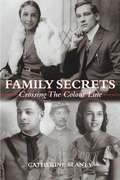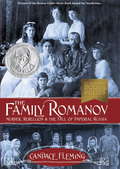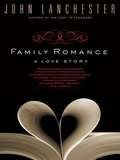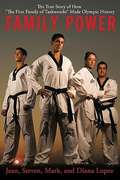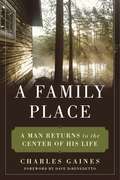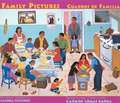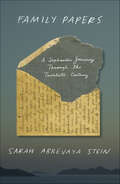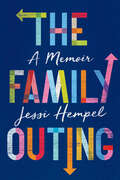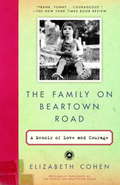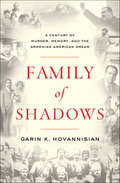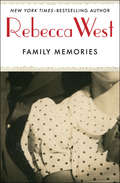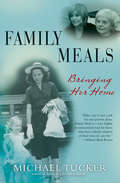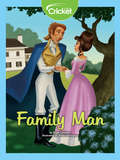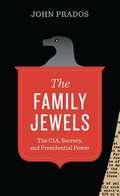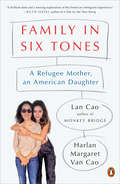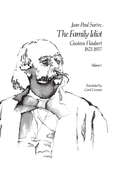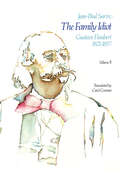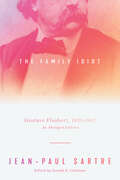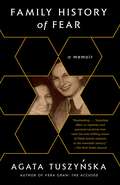- Table View
- List View
Family Secrets: Crossing the Colour Line
by Catherine Slaney Daniel G. HillCatherine Slaney grew into womanhood unaware of her celebrated Black ancestors. An unanticipated meeting was to change her life. Her great-grandfather was Dr. Anderson Abbott, the first Canadian-born Black to graduate from medical school in Toronto in 1861. In Family Secrets Catherine Slaney narrates her journey along the trail of her family tree, back through the era of slavery and the plight of fugitive slaves, the Civil War, the Elgin settlement near Chatham, Ontario, and the Chicago years. Why did some of her family identify with the Black Community while others did not? What role did "passing" play? Personal anecdotes and excerpts from archival Abbott family papers enliven the historical context of this compelling account of a family dealing with an unknown past. A welcome addition to African-Canadian history, this moving and uplifting story demonstrates that understanding one’s identity requires first the embracing of the past. "When Catherine Slaney first consulted me, her intention was to research the life of her distinguished ancestor Anderson R. Abbott. After she told me her story of the discovery of her African heritage and the search for her roots, I urged her to make that the subject of her book. Cathy has served both of these objectives, giving us an intricate and fascinating account of her quest for her own lost identity through the gradual illumination of Dr. Abbott and his legacy for modern Canadians. Family Secrets carries an important message about the issue of ’race’ as a historical artifact and as a factor in the lives of real people."– James W. St. G. Walker, University of Waterloo "This is a welcome addition to the growing collection of African-Canadian materials that connects an unknown past to a promising future. That Slaney was unaware of her Black ancestry, despite that heritage being so rich and powerful, speaks to the dilemma of Black history research – it is there but requires considerable digging to uncover."– Rosemary Sadlier, President, Ontario Black History Society
The Family Romanov: Murder, Rebellion, and the Fall of Imperial Russia
by Candace Fleming"Marrying the intimate family portrait of Heiligman's Charles and Emma with the politics and intrigue of Sheinkin's Bomb, Fleming has outdone herself with this riveting work of narrative nonfiction that appeals to the imagination as much as the intellect." --The Horn Book, StarredFrom the acclaimed author of Amelia Lost and The Lincolns comes a heartrending narrative nonfiction page-turner--and a perfect resource for meeting Common Core standards. When Russia's last tsar, Nicholas II, inherited the throne in 1894, he was unprepared to do so. With their four daughters (including Anastasia) and only son, a hemophiliac, Nicholas and his reclusive wife, Alexandra, buried their heads in the sand, living a life of opulence as World War I raged outside their door and political unrest grew into the Russian Revolution.Deftly maneuvering between the lives of the Romanovs and the plight of Russia's peasants and urban workers--and their eventual uprising--Fleming offers up a fascinating portrait, complete with inserts featuring period photographs and compelling primary-source material that brings it all to life."An exhilarating narrative history of a doomed and clueless family and empire." --Jim Murphy, author of Newbery Honor Books An American Plague and The Great Fire"For readers who regard history as dull, Fleming's extraordinary book is proof positive that, on the contrary, it is endlessly fascinating, absorbing as any novel, and the stuff of an altogether memorable reading experience." --Booklist, Starred<P><P> Winner of the Sibert Honor
Family Romance
by John LanchesterFamily Romance is a beautifully written memoir in which John Lanchester joins the dots of his parents' history, their extraordinary secrets and the shape of their shared life. From his grandparents' beginnings in rural Ireland and colonial Rhodesia, Lanchester navigates through his parents' lives: his father Bill's devastating war-time separation from his parents; his mother Julia's tragic first love, her decision to become a nun and her adoption of a new identity. Lanchester illuminates their characters and Julia's motives with moving insight.
Family Power: The True Story of How "The First Family of Taekwondo" Made Olympic History
by Mark Lopez Diana Lopez Steve Lopez Jean LopezAn inspiring sports memoir from the family who captured America?s heart at the 2008 Beijing Olympics. The Lopez family set new records at the Beijing Olympics with three siblings on the same U.S. taekwondo team?and a fourth sibling as their coach. Mark took the silver medal, and Steven and Diana both brought home the bronze, with big brother Jean coaching them to victory. Here, for the first time, is the inspiring story of a family united behind a dream. In 1972 Julio Lopez and his wife Ondina emigrated from Nicaragua, hoping for a better life for their family in America. In an atmosphere of love, support, mutual respect, and healthy competition, their children trained hard in taekwondo, daring to dream they might reach the pinnacle of their athletic field in the Olympics. Told in turn by Steven, Mark, Diana, and Jean, this is the incredible story of how one close-knit family?s boundless determination and rock-solid support system took them from their home in Texas to Olympic glory in Beijing.
Family Portrait
by Catherine Drinker BowenIn Family Portrait I meet my brothers not obliquely but head on. Together we skate on the Lehigh Canal; the black ice rushes beneath our feet and across the river at the steel works; the open hearth fires glow red and high as any imagined hell. Together we sail our boats on Jersey waters; in the old parlor in Bethlehem Harry and I make music with piano and violin. Always, in real life, my brothers were teaching me; they looked down from their heights and pulled me along.
A Family Place: A Man Returns to the Center of His Life
by Charles Gaines Dave DiBenedettoIn the summer of 1990, writer Charles Gaines and his artist wife, Patricia, bought 160 acres of wild land on the northeast coast of Nova Scotia. They believed they were simply buying a remote getaway spot, but within a few months a more complex dream for the property developed. By midwinter, they had begun to see the land as a place where family intimacy might be reclaimed, as a home that might heal their recently battered marriage, and as an opportunity to take on a big, risky, long-term project instead of settling into the caution and gradual losses of middle-class middle age. Enlisting their children and their daughter’s carpenter boyfriend, they decided to build a cabin on the land the following summer, to build it with their own hands, as a family venture.A Family Place gracefully mixes a narrative of that summer’s sometimes harrowing, sometimes hilarious, sometimes heartbreaking events with passages of the family’s history that show its members as real people and dramatize what is at stake for each of them in Nova Scotia. Gaines describes the process of building a cabin while living in tents without electricity or running water, and the pleasures and limitations of a life so simplified that a week’s biggest social event is a bonfire. He draws a deft portrait of the small, generous, hearth-centered Acadian community of farmers and lobster fishermen surrounding their land, and traces the history of that land to its original French-Acadian owner. And he tracks the mood of his family through the long, difficult summer, from initial enthusiasm to near mutiny, and finally to exhilaration and deep satisfaction at having built something that will last, having rebuilt a family in the process.
Family Pictures / Cuadros de Familia
by Carmen Lomas Garza<P>Family Pictures is the story of Carmen Lomas Garza's girlhood: celebrating birthdays, making tamales, finding a hammerhead shark on the beach, picking cactus, going to a fair in Mexico, and confiding to her sister her dreams of becoming an artist. <P>These day-to-day experiences are told through fourteen vignettes of art and a descriptive narrative, each focusing on a different aspect of traditional Mexican American culture. The English-Spanish text and vivid illustrations reflect the author's strong sense of family and community. For Mexican Americans, Carmen Lomas Garza offers a book that reflects their lives and traditions. For others, this work offers insights into a beautifully rich community. <P>[This text is listed as an example that meets Common Core Standards in English language arts for K-1 at http://www.corestandards.org.]
Family Papers: A Sephardic Journey Through the Twentieth Century
by Sarah Abrevaya SteinNamed one of the best books of 2019 by The Economist and a New York Times Book Review Editors' Choice. A National Jewish Book Award finalist."A superb and touching book about the frailty of ties that hold together places and people." --The New York Times Book ReviewAn award-winning historian shares the true story of a frayed and diasporic Sephardic Jewish family preserved in thousands of lettersFor centuries, the bustling port city of Salonica was home to the sprawling Levy family. As leading publishers and editors, they helped chronicle modernity as it was experienced by Sephardic Jews across the Ottoman Empire. The wars of the twentieth century, however, redrew the borders around them, in the process transforming the Levys from Ottomans to Greeks. Family members soon moved across boundaries and hemispheres, stretching the familial diaspora from Greece to Western Europe, Israel, Brazil, and India. In time, the Holocaust nearly eviscerated the clan, eradicating whole branches of the family tree. In Family Papers, the prizewinning Sephardic historian Sarah Abrevaya Stein uses the family’s correspondence to tell the story of their journey across the arc of a century and the breadth of the globe. They wrote to share grief and to reveal secrets, to propose marriage and to plan for divorce, to maintain connection. They wrote because they were family. And years after they frayed, Stein discovers, what remains solid is the fragile tissue that once held them together: neither blood nor belief, but papers.With meticulous research and care, Stein uses the Levys' letters to tell not only their history, but the history of Sephardic Jews in the twentieth century.
The Family Outing: A Memoir
by Jessi Hempel“Fascinating, funny, and wise, The Family Outing is an affirmation to all of us who know the pain and shame of hiding our truest self, and a stirring invitation into the courage, freedom, and joy of living our whole truth.”—Glennon Doyle, author of #1 New York Times bestseller Untamed, founder of Together RisingA striking and remarkable literary memoir about one family’s transformation, with almost all of them embracing their queer identities.Jessi Hempel was raised in a seemingly picture-perfect, middle-class American family. But the truth was far from perfect. Her father was constantly away from home, traveling for work, while her stay-at-home mother became increasingly lonely and erratic. Growing up, Jessi and her two siblings struggled to make sense of their family, their world, their changing bodies, and the emotional turmoil each was experiencing. And each, in their own way, was hiding their true self from the world.By the time Jessi reached adulthood, everyone in her family had come out: Jessi as gay, her sister as bisexual, her father as gay, her brother as transgender, and her mother as a survivor of a traumatic experience with an alleged serial killer. Yet coming out was just the beginning, starting a chain reaction of other personal revelations and reckonings that caused each of them to question their place in the world in new and ultimately liberating ways.
The Family on Beartown Road
by Elizabeth CohenANew York Times Notable Book The Family on Beartown Roadis Elizabeth Cohen’s true and moving portrait of love and courage. Elizabeth, a member of the “sandwich generation”—those caught in the middle, simultaneously caring for their children and for their aging parents—is the mother of baby Ava and the daughter of Daddy, and responsible for both. In this story full of everyday triumphs, first steps, and an elder’s confusion, Ava finds each new picture, each new word, each new song, something to learn greedily, joyfully. Daddy is a man in his twilight years, for whom time moves slowly and lessons are not learned but quietly, frustratingly forgotten. Elizabeth, a suddenly single mother with a career and a mortgage and a hamperful of laundry, finds her world spiraling out of control. Faced with mounting disasters, she chooses to confront life head-on, and to see the unique beauty in each and every moment. Imbued with an unquenchable spirit,The Family on Beartown Roadtakes us on a journey through the remarkable landscape that is family. From the Trade Paperback edition.
Family of Shadows: A Century of Murder, Memory, and the Armenian American Dream
by Garin K. HovannisianCombining the historical urgency of The Burning Tigris, the cultural sweep of Middlesex, and the psychological complexity of Bending Toward the Sun, Garin K. Hovannisian's Family of Shadows is a searing history of Armenia, realized through the lives of three generations of a single family. In Family of Shadows, Hovannisian traces the arc of his family's changing relationship to its motherland, from his great-grandfather's flight to America after surviving the Armenian Genocide to his father Raffi Hovannisian's repatriation and subsequent climb to political prominence as the head of the Heritage Party. Hovannisian's articles on Armenian issues, including the Genocide, the Armenian Diaspora, and the challenges of post-Soviet statehood, have appeared in the Los Angeles Times, Christian Science Monitor, Chicago Tribune, Armenian Observer, Ararat, and numerous other publications.
The Family of Abraham
by Carol BakhosThe term "Abrahamic religions" has gained considerable currency in both scholarly and ecumenical circles as a way of referring to Judaism, Christianity, and Islam. In The Family of Abraham, Carol Bakhos steps back from this convention to ask a frequently overlooked question: What, in fact, is Abrahamic about these three faiths? Exploring diverse stories and interpretations relating to the portrayal of Abraham, she reveals how he is venerated in these different scriptural traditions and how scriptural narratives have been pressed into service for nonreligious purposes. Grounding her study in a close examination of ancient Jewish textual practices, primarily midrash, as well as medieval Muslim Stories of the Prophets and the writings of the early Church Fathers, Bakhos demonstrates that ancient and early-medieval readers often embellished the image of Abraham and his family--Sarah, Hagar, Ishmael, and Isaac. Her analysis dismantles pernicious misrepresentations of Abraham's firstborn son, Ishmael, and provocatively challenges contemporary references to Judaism and Islam as sibling religions. As Bakhos points out, an uncritical adoption of the term "Abrahamic religions" not only blinds us to the diverse interpretations and traditions of Judaism, Christianity, and Islam but also artificially separates these faiths from their historical contexts. In correcting mistaken assumptions about the narrative and theological significance of Abraham, The Family of Abraham sheds new light on key figures of three world religions.
Family Memories: An Autobiographical Journey
by Rebecca WestWest's wise and entertaining memoir--now available as an ebookPublished posthumously, this family history and memoir offers keen insight into the origins of Rebecca West and her workWorking on Family Memories for over twenty years, West set out to narrate the story of her mother's, father's and husband's unique and talented families. As in her novels, the richly drawn characters of her heritage and childhood traverse a diverse landscape, from Scotland to Australia to Africa, encountering love, loss, and a panoply of challenges. Although fans will recognize many settings, characters, and themes from her novels, West's exploration of her family stands on its own as an engaging narrative. Told with her compelling voice, West's chronicles reflect not only the importance of family to identity, but to the way one relates to the larger world.
Family Meals: Bringing Her Home
by Michael TuckerMichael Tucker and his wife Jill Eikenberry are enjoying the early years of retirement in their dream house, a beautiful 350-year-old stone farmhouse in the central Italian province of Umbria, but Jill’s mother Lora is a constant source of worry. Lora is eighty-seven and her second husband of many years, Ralph, has just turned ninety-one. Jill is traveling frequently to Lora and Ralph’s home in Santa Barbara from the Tucker’s pied-à-terre in New York, disrupting their plans to vacation in Italy for 6 months of the year. The elderly couple (Lora and Ralph, that is) have transitioned from independent living to an Assisted Care facility in Santa Barbara; Ralph has just had a third heart attack and suffers from chronic back pain, while Lora is beginning to slip mentally and is nearly deaf, although she refuses to wear a hearing aid.In fact, the couple is preparing to take a much needed three-month vacation in Italy when life gets in the way. Michael and Jill must visit Lora and Ralph in Santa Barbara, making sure that everything in the elders’ lives is in order-their finances, their caretaking situation, their apartment. The couple then returns to Italy for much-needed respite, and prepare to be joined by their friends, the Shechtmans and the Liedermans. In preparation, Michael and Jill drive into town and purchase tickets for a symphony concert of the St. Petersburg Symphony Orchestra in the magnificent Spoleto Cathedral, a program that is part of the celebrated Spoleto Festival. After a fabulous meal at one of their favorite restaurants, Jill and Michael walk home and as they prepare to get to bed Jill learns the terrible news that Ralph has passed away.Jill has received the call from Josie, Ralph’s caretaker, that he has died-he has suffered a series of small yet fatal strokes-and Jill calls her mother and breaks the news, as Lora has not yet been told. Michael is able to book tickets for the couple to fly home, and calls his children, who will also travel to California to be with Lora. When they get there, a lot is to be done. Ralph is cremated, and Michael and Jill must meet with Ralph’s daughter Kathy and review Ralph’s finances, and meanwhile must take control over Lora’s finances and medical insurance. Lora has many friends in Santa Barbara, and they assure the Tuckers that they will care for Jill’s mom, and so Michael and Jill return to Italy to resume their life.What happens next is a brilliant surprise that neither Michael nor Jill could have expected or planned. Lora decides to move from her home in Santa Barbara to New York City, and finds an apartment in the building in which Michael and Jill live. Then Michael and Jill’s children, Alison and Max, decide not only to relocate to Manhattan but also move in together, reuniting the Tucker/Eikenberry clan after years of separation.Michael Tucker brings alive the joys and challenges that families give us. Family Meals is a heart-warming, beautifully told story of his own unique family and the journeys each of them have taken. It is a book that addresses a fact of life all of us will face-aging-with remarkable charm, sympathy and warmth, and a celebratory book that explores the responsibility we have to our families. It is also a book that explores the different ways that families experience life-how different clans and different cultures celebrate, support, care and mourn.
Family Man
by Diana ChildressDid you founding father Alexander Hamilton had eight children? Learn more about this important historical figure in this story.
The Family Jewels: The CIA, Secrecy, and Presidential Power
by John PradosIn December 1974, a front-page story in the New York Times revealed the explosive details of illegal domestic spying by the Central Intelligence Agency. This included political surveillance, eavesdropping, detention, and interrogation. The revelation of illegal activities over many years shocked the American public and led to investigations of the CIA by a presidential commission and committees in both houses of Congress, which found evidence of more abuse, even CIA plans for assassinations. Investigators and the public soon discovered that the CIA abuses were described in a top-secret document agency insiders dubbed the "Family Jewels. " That document became ground zero for a political firestorm that lasted more than a year. The "Family Jewels" debacle ultimately brought about greater congressional oversight of the CIA, but excesses such as those uncovered in the 1970s continue to come to light. The Family Jewels probes the deepest secrets of the CIA and its attempts to avoid scrutiny. John Prados recounts the secret operations that constituted "Jewels" and investigators' pursuit of the truth, plus the strenuous efforts-by the agency, the executive branch, and even presidents-to evade accountability. Prados reveals how Vice President Richard Cheney played a leading role in intelligence abuses and demonstrates that every type of "Jewel" has been replicated since, especially during the post-9/11 war on terror. The Family Jewels masterfully illuminates why these abuses are endemic to spying, shows that proper relationships are vital to control of intelligence, and advocates a system for handling "Family Jewels" crises in a democratic society.
Family in Six Tones: A Refugee Mother, an American Daughter
by Lan Cao Harlan Margaret Van Cao"A brilliant duet and a moving exploration of the American immigrant experience."--Ruth Ozeki, author of A Tale for the Time BeingA dual first-person memoir by the acclaimed Vietnamese-American novelist and her thoroughly American teenage daughterIn 1975, thirteen-year-old Lan Cao boarded an airplane in Saigon and got off in a world where she faced hosts she had not met before, a language she didn't speak, and food she didn't recognize, with the faint hope that she would be able to go home soon. Lan fought her way through confusion, and racism, to become a successful lawyer and novelist. Four decades later, she faced the biggest challenge in her life: raising her daughter Harlan--half Vietnamese by birth and 100 percent American teenager by inclination. In their lyrical joint memoir, told in alternating voices, mother and daughter cross ages and ethnicities to tackle the hardest questions about assimilation, aspiration, and family.Lan wrestles with her identities as not merely an immigrant but a refugee from an unpopular war. She has bigoted teachers who undermine her in the classroom and tormenting inner demons, but she does achieve--either despite or because of the work ethic and tight support of a traditional Vietnamese family struggling to get by in a small American town. Lan has ambitions, for herself, and for her daughter, but even as an adult feels tentative about her place in her adoptive country, and ventures through motherhood as if it is a foreign landscape.Reflecting and refracting her mother's narrative, Harlan fiercely describes the rites of passage of childhood and adolescence, filtered through the aftereffects of her family's history of war, tragedy, and migration. Harlan's struggle to make friends in high school challenges her mother to step back and let her daughter find her own way.Family in Six Tones speaks both to the unique struggles of refugees and to the universal tug-of-war between mothers and daughters. The journey of an immigrant--away from war and loss toward peace and a new life--and the journey of a mother raising a child to be secure and happy are both steep paths filled with detours and stumbling blocks. Through explosive fights and painful setbacks, mother and daughter search for a way to accept the past and face the future together.
The Family Idiot: Gustave Flaubert, 1821-1857, Volume 1 (The Family Idiot #1)
by Jean-Paul SartreThat Sartre's study of Flaubert, The Family Idiot, is a towering achievement in intellectual history has never been disputed. Yet critics have argued about the precise nature of this novel, or biography, or "criticism-fiction" which is the summation of Sartre's philosophical, social, and literary thought. Sartre writes, simply, in the preface to the book: "The Family Idiot is the sequel to The Question of Method. The subject: what, at this point in time, can we know about a man? It seemed to me that this question could only be answered by studying a specific case." "A man is never an individual," Sartre writes, "it would be more fitting to call him a universal singular. Summed up and for this reason universalized by his epoch, he in turn resumes it by reproducing himself in it as singularity. Universal by the singular universality of human history, singular by the universalizing singularity of his projects, he requires simultaneous examination from both ends." This is the method by which Sartre examines Flaubert and the society in which he existed. Now this masterpiece is being made available in an inspired English translation that captures all the variations of Sartre's style—from the jaunty to the ponderous—and all the nuances of even the most difficult ideas. Volume 1 consists of Part One of the original French work, La Constitution, and is primarily concerned with Flaubert's childhood and adolescence.
The Family Idiot: Gustave Flaubert, 1821-1857, Volume 1 (The Family Idiot #1)
by Jean-Paul SartreThat Sartre's study of Flaubert, The Family Idiot, is a towering achievement in intellectual history has never been disputed. Yet critics have argued about the precise nature of this novel, or biography, or "criticism-fiction" which is the summation of Sartre's philosophical, social, and literary thought. Sartre writes, simply, in the preface to the book: "The Family Idiot is the sequel to The Question of Method. The subject: what, at this point in time, can we know about a man? It seemed to me that this question could only be answered by studying a specific case." "A man is never an individual," Sartre writes, "it would be more fitting to call him a universal singular. Summed up and for this reason universalized by his epoch, he in turn resumes it by reproducing himself in it as singularity. Universal by the singular universality of human history, singular by the universalizing singularity of his projects, he requires simultaneous examination from both ends." This is the method by which Sartre examines Flaubert and the society in which he existed. Now this masterpiece is being made available in an inspired English translation that captures all the variations of Sartre's style—from the jaunty to the ponderous—and all the nuances of even the most difficult ideas. Volume 1 consists of Part One of the original French work, La Constitution, and is primarily concerned with Flaubert's childhood and adolescence.
The Family Idiot: Gustave Flaubert, 1821-1857, Volume 5 (The Family Idiot #5)
by Jean-Paul SartreWith this volume, the University of Chicago Press completes its translation of a work that is indispensable not only to serious readers of Flaubert but to anyone interested in the last major contribution by one of the twentieth century's greatest thinkers. That Sartre's study of Flaubert, The Family Idiot, is a towering achievement in intellectual history has never been disputed. Yet critics have argued about the precise nature of this novel or biography or "criticism-fiction" which is the summation of Sartre's philosophical, social, and literary thought. In the preface, Sartre writes: "The Family Idiot is the sequel to Search for a Method. The subject: what, at this point in time, can we know about a man? It seemed to me that this question could only be answered by studying a specific case." Sartre discusses Flaubert's personal development, his relationship to his family, his decision to become a writer, and the psychosomatic crisis or "conversion" from his father's domination to the freedom of his art. Sartre blends psychoanalysis with a sociological study of the ideology of the period, the crisis in literature, and Flaubert's influence on the future of literature. While Sartre never wrote the final volume he envisioned for this vast project, the existing volumes constitute in themselves a unified work—one that John Sturrock, writing in the Observer, called "a shatteringly fertile, digressive and ruthless interpretation of these few cardinal years in Flaubert's life." "A virtuoso perfomance. . . . For all that this book does to make one reconsider his life, The Family Idiot is less a case study of Flaubert than it is a final installment of Sartre's mythology. . . . The translator, Carol Cosman, has acquitted herself brilliantly."—Frederick Brown, New York Review of Books "A splendid translation by Carol Cosman. . . . Sartre called The Family Idiot a 'true novel,' and it does tell a story and eventually reach a shattering climax. The work can be described most simply as a dialectic, which shifts between two seemingly alternative interpretations of Flaubert's destiny: a psychoanalytic one, centered on his family and on his childhood, and a Marxist one, whose guiding themes are the status of the artist in Flaubert's period and the historical and ideological contradictions faced by his social class, the bourgeoisie."—Fredric Jameson, New York Times Book Review Jean-Paul Sartre (1906-1980) was offered, but declined, the Nobel Prize for literature in 1964. His many works of fiction, drama, and philosophy include the monumental study of Flaubert, The Family Idiot, and The Freud Scenario, both published in translation by the University of Chicago Press.
The Family Idiot: Gustave Flaubert, 1821-1857, Volume 5 (The Family Idiot #5)
by Jean-Paul SartreWith this volume, the University of Chicago Press completes its translation of a work that is indispensable not only to serious readers of Flaubert but to anyone interested in the last major contribution by one of the twentieth century's greatest thinkers. That Sartre's study of Flaubert, The Family Idiot, is a towering achievement in intellectual history has never been disputed. Yet critics have argued about the precise nature of this novel or biography or "criticism-fiction" which is the summation of Sartre's philosophical, social, and literary thought. In the preface, Sartre writes: "The Family Idiot is the sequel to Search for a Method. The subject: what, at this point in time, can we know about a man? It seemed to me that this question could only be answered by studying a specific case." Sartre discusses Flaubert's personal development, his relationship to his family, his decision to become a writer, and the psychosomatic crisis or "conversion" from his father's domination to the freedom of his art. Sartre blends psychoanalysis with a sociological study of the ideology of the period, the crisis in literature, and Flaubert's influence on the future of literature. While Sartre never wrote the final volume he envisioned for this vast project, the existing volumes constitute in themselves a unified work—one that John Sturrock, writing in the Observer, called "a shatteringly fertile, digressive and ruthless interpretation of these few cardinal years in Flaubert's life." "A virtuoso perfomance. . . . For all that this book does to make one reconsider his life, The Family Idiot is less a case study of Flaubert than it is a final installment of Sartre's mythology. . . . The translator, Carol Cosman, has acquitted herself brilliantly."—Frederick Brown, New York Review of Books "A splendid translation by Carol Cosman. . . . Sartre called The Family Idiot a 'true novel,' and it does tell a story and eventually reach a shattering climax. The work can be described most simply as a dialectic, which shifts between two seemingly alternative interpretations of Flaubert's destiny: a psychoanalytic one, centered on his family and on his childhood, and a Marxist one, whose guiding themes are the status of the artist in Flaubert's period and the historical and ideological contradictions faced by his social class, the bourgeoisie."—Fredric Jameson, New York Times Book Review Jean-Paul Sartre (1906-1980) was offered, but declined, the Nobel Prize for literature in 1964. His many works of fiction, drama, and philosophy include the monumental study of Flaubert, The Family Idiot, and The Freud Scenario, both published in translation by the University of Chicago Press.
The Family Idiot: Gustave Flaubert, 1821–1857, An Abridged Edition
by Jean-Paul SartreAn approachable abridgment of Sartre’s important analysis of Flaubert. From 1981 to 1994, the University of Chicago Press published a five-volume translation of Jean-Paul Sartre’s The Family Idiot: Gustave Flaubert, 1821-1857, a sprawling masterwork by one of the greatest intellects of the twentieth century. This new volume delivers a compact abridgment of the original by renowned Sartre scholar, Joseph Catalano. Sartre claimed that his existential approach to psychoanalysis required a new Freud, and in his study of Gustave Flaubert, Sartre becomes that Freud. The work summarizes Sartre’s overarching aim to reveal that human life is a meaningful adventure of freedom. In discussing Flaubert’s work, particularly his classic novel Madame Bovary, Sartre unleashes a fierce critique of modernity as nihilistic and demeaning of human dignity.
The Family Idiot: Gustave Flaubert, 1821–1857, An Abridged Edition
by Jean-Paul SartreAn approachable abridgment of Sartre’s important analysis of Flaubert. From 1981 to 1994, the University of Chicago Press published a five-volume translation of Jean-Paul Sartre’s The Family Idiot: Gustave Flaubert, 1821-1857, a sprawling masterwork by one of the greatest intellects of the twentieth century. This new volume delivers a compact abridgment of the original by renowned Sartre scholar, Joseph Catalano. Sartre claimed that his existential approach to psychoanalysis required a new Freud, and in his study of Gustave Flaubert, Sartre becomes that Freud. The work summarizes Sartre’s overarching aim to reveal that human life is a meaningful adventure of freedom. In discussing Flaubert’s work, particularly his classic novel Madame Bovary, Sartre unleashes a fierce critique of modernity as nihilistic and demeaning of human dignity.
The Family Idiot: Gustave Flaubert, 1821–1857, An Abridged Edition
by Jean-Paul SartreAn approachable abridgment of Sartre’s important analysis of Flaubert. From 1981 to 1994, the University of Chicago Press published a five-volume translation of Jean-Paul Sartre’s The Family Idiot: Gustave Flaubert, 1821-1857, a sprawling masterwork by one of the greatest intellects of the twentieth century. This new volume delivers a compact abridgment of the original by renowned Sartre scholar, Joseph Catalano. Sartre claimed that his existential approach to psychoanalysis required a new Freud, and in his study of Gustave Flaubert, Sartre becomes that Freud. The work summarizes Sartre’s overarching aim to reveal that human life is a meaningful adventure of freedom. In discussing Flaubert’s work, particularly his classic novel Madame Bovary, Sartre unleashes a fierce critique of modernity as nihilistic and demeaning of human dignity.
Family History of Fear
by Agata Tuszynska"Family History of Fear has been in me for years. Along with this secret. From the instant I found out I was not who I thought I was." Every family has its own history. Many families carry a tragic past. Like the author's mother, many Poles did not tell their children a complete story of their wartime exploits--of the underground Home Army, the tragedy of the Warsaw Uprising, the civil war against the Communists. Years had to pass before the stories of suffering and heroism could be told.In Family History of Fear, Agata Tuszyńska, one of Poland's most admired poets and cultural historians, writes of the stories she heard from her mother about her secret past. Tuszyńska, author of Vera Gran ("a book of extraordinary depth and power"--Richard Eder, The Boston Globe; "captivating"--Newsweek; "darkly absorbing, shrewd, and sharply etched"--Publishers Weekly), has written a powerful memoir about growing up after the Second World War in Communist Poland--blonde, blue-eyed, and Catholic.The author was nineteen years old and living in Warsaw when her mother told her the truth--that she was Jewish--and began to tell her stories of the family's secret past in Poland. Tuszyńska, who grew up in a country beset by anti-Semitism, rarely hearing the word "Jew" (only from her Polish Catholic father, and then, always in derision), was unhinged, ashamed, and humiliated. The author writes of how she skillfully erased the truth within herself, refusing to admit the existence of her other half. In this profoundly moving and resonant book, Tuszyńska investigates her past and writes of her journey to uncover her family's history during World War II--of her mother at age eight and her mother, entering the Warsaw Ghetto for two years as conditions grew more desperate, and finally escaping just before the uprising, and then living "hidden on the other side." She writes of her father, one of five thousand Polish soldiers taken prisoner in 1939, becoming, later, the country's most famous radio sports announcer; and of her relatives and their mysterious pasts, as she tries to make sense of the hatred of Jews in her country. She writes of her discoveries and of her willingness to accept a radically different definition of self, reading the works of Isaac Bashevis Singer, opening up for her a world of Polish Jewry as he became her guide, and then writing about his life and work, circling her Jewish self in Lost Landscapes: In Search of Isaac Bashevis Singer and the Jews of Poland. A beautiful and affecting book of discovery and acceptance; a searing, insightful portrait of Polish Jewish life, lived before and after Hitler's Third Reich.From the Hardcover edition.
